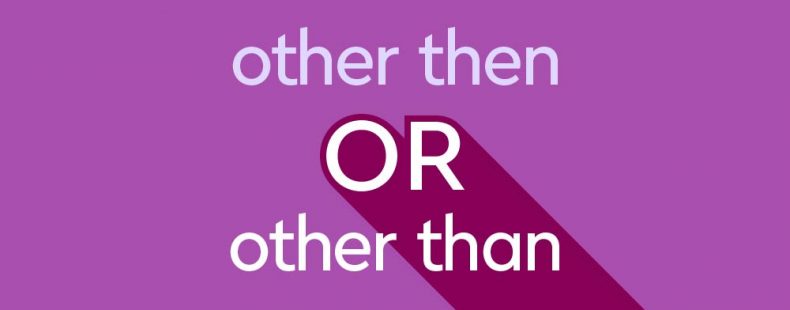⚡ Quick summary
Other than is a phrase used to mean “besides” or “except for.” It is a synonym of barring and apart from. The phrase “other then” doesn’t have a meaning in English. It is a common grammatical error to use other then instead of other than.
The words then and than look very similar and are often pronounced the same. However, these two confusing words have entirely different meanings and are used in different ways. This confusion also extends to phrases that use one of these two words, such as other than. Or is it other then?
In this article, we break down the difference between other than and other then, explain why only other than is considered to be grammatically correct, and give examples of how other than is typically used.
other than vs. other then
The phrase other than is typically used to mean “besides” or “apart from.” Other than is a synonym of words and phrases such as barring or except for.
For example:
- Do you eat anything other than fast food? (Do you eat anything besides fast food?)
- You’ll never pass the test other than by studying hard. (You’ll never pass the test in any other way except by studying hard.)
The phrase other then has no meaning. The words other and then do not form a meaningful phrase when used together. It is possible that the words other and then may appear next to each other in a sentence, but they are used as separate words and not as one phrase.
For example:
- We’ll meet at 10 o’clock; we’ll see each other then.
By itself, the word than is used as a conjunction or preposition to make comparisons or point out exceptions. In this sense, than is often combined with adverbs and adjectives to make comparisons, present alternatives, or denote differences. Other is not the only adverb or adjective that can be used before than for this purpose.
For example:
- I’d like to be anywhere else than here right now.
- Rather than continue to argue, he walked away.
The word then is used as an adjective, adverb, and noun to refer to time and a few other specific meanings. It isn’t used as a preposition or conjunction, so it can’t have objects or be used to connect sentences the way than or other than can. The word then is not used by itself or alongside adverbs or adjectives to make comparisons or denote exceptions.
It is a grammatical mistake to use then when you mean than, and this includes phrases that include than, such as other than.
For example:
- Incorrect: Other then brussels sprouts, I don’t mind vegetables.
- Correct: Other than brussels sprouts, I don’t mind vegetables.














